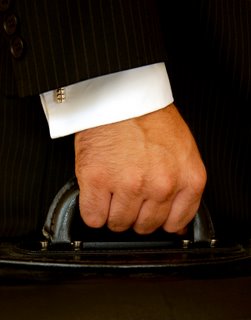
Yesterday I wrote about privacy in the context of client information disclosed in public court files. Today is a guest blog on the related issue of lawyer information, specifically our Social Security Numbers, being collected by New York’s Office of Court Administration. Do the courts have any legal authority to collect those numbers from us?
This article was first published in the June issue of Suffolk Lawyer (pp 25, 31) and is presented here by the author, Stephen Kruger for wider distribution.
——————————————————-
SSNs May Not Be Collected for Biennial Registration
by Stephen Kruger
kruger3644 [at] yahoo [dot] com
Abstract
Upon biennial registration, a New York lawyer is to disclose his social-security number to the New York Office of Court Administration. There is no legal basis for disclosure. The disclosure requirement is ultra vires.
Also, the OCA fails to provide a proper Privacy Act notice. The disclosure requirement is unenforceable.
Judiciary Law 468-b should not be amended to permit collection of SSNs by the OCA for attorney-registration purposes. SSNs were transformed into de-facto national-identity numbers. Though use of SSNs abounds, one more permissible collection of SSNs is a big deal. Liberty is lost in increments; liberty must be regained in increments. Since March 4, 1933, liberty has been entirely lost. A start to restoration of liberty must be made somewhere. Refusal of use of SSNs for attorney registration is a good place to start.
Article
Upon biennial registration, a New York lawyer is to disclose his social-security number to the New York Office of Court Administration. 22 N.Y.C.R.R. 118.1(e). There is no legal basis for disclosure.
It is “the policy of the United States” that, in the administration of state or local taxes, welfare, driver licenses, or motor-vehicle registrations, a state or local government “may . . . utilize” SSNs “for the purpose of establishing the identification of individuals affected by such law[.]” 42 U.S.C. 405(c)(2)(C)(i). A statement of a policy is not authority for a lawyer-financed client-compensation account to act, any more than a sense-of-the-Congress resolution is authority for a United States agency to act.
It is an open question, in any event, whether the $350 paid for biennial registration is a tax under New York law. The OCA describes the $350 payment as a fee.
New York Judiciary Law 468-a, the subject of which is biennial registration of attorneys, doesn’t mention SSNs at all. Disclosure of SSNs was instituted unilaterally by the OCA.
Absent a United States law which authorizes the OCA to require disclosures by lawyers of SSNs, and absent a New York law which permits the OCA to require disclosures by lawyers of their SSNs, the disclosure requirement of the OCA is ultra vires, and void.
Moreover, the OCA fails to provide a proper Privacy Act notice.
There is an uncodified provision of the Privacy Act (Pub. L. No. 93-579, Sect. 7, note to 5 U.S.C. Sect. 552a), Sect 7(a)(1) of which states that no one is required to disclose an SSN to a governmental agency, and no one may be penalized for not disclosing an SSN, unless the prescribed notice is given by the governmental agency.
Section 7(b) of the uncodified provision prescribes that a notice is to set forth whether disclosure is mandatory or is voluntary, the statutory or other authority for disclosure, and the uses which will be made of the disclosed SSN.
The Sect. 7(b) notice provided by the OCA is, “Social Security numbers are required in order to administer the collection of revenue obtained from attorney registration fees. 42 U.S.C. 405(c)(2)(C)(i). Social Security numbers will not be made public.
Inexplicably, the OCA notice does not track the form and language of Privacy Act 7(b). There are as well substantive deficiencies with the OCA notice.
The OCA asserts, in its Privacy Act 7(b) notice, that SSNs “are required in order to administer the collection of revenue obtained from attorney registration fees.” Administration is not the statutory rationale for collecting SSNs, and neither is collection of revenue. 42 U.S.C. 405(c)(2)(C)(i) specifies that, in the administration of laws such as tax laws, SSNs are for “establishing the identification of individuals affected by such law[.]”
There is no assertion by the OCA, in its Privacy Act 7(b) notice, that SSNs are used by the OCA for the purpose of identification of lawyers, because that assertion would be baseless. It is the province of the Appellate Division, not of the OCA, to identify lawyers. The Appellate Division informs the OCA who is a lawyer, by reference to the roll of attorneys maintained by each department of the Appellate Division.
The OCA keeps track of lawyers by assigning a number to each lawyer. An OCA number is not a Bar number. Rather, an OCA number is for internal record-keeping by the OCA. “Q: What is my New York Bar number?,” available at http://www.courts.state.ny.us/attorneys.
SSNs are extraneous to OCA administration. Use by the OCA, in its Privacy Act 7(b) notice, of “in order to administer the collection of revenue obtained from attorney registration fees[,]” is misleading.
The OCA states, in its Privacy Act 7(b) notice, “Social Security numbers will not be made public.” That statement, which is in the negative, does not meet the Privacy Act requirement that a Sect. 7(b) notice set forth the uses which will be made of disclosed SSNs. It is likely that the OCA allows use of collected SSNs for criminal matters, such as investigation, and allows use of collected SSNs for civil matters, such as obtaining overdue child-support payments.
Absent a sufficient Privacy Act 7(b) notice by the OCA, the requirement that a lawyer disclose his SSN is unenforceable.
Should Judiciary Law 468-b be amended to permit collection of SSNs by the OCA for attorney-registration purposes? Seemingly, one more permissible collection of SSNs is not a big deal, inasmuch as there is a socialist, authoritarian regime in Albany, the little brother of the socialist, authoritarian regime in the District of Columbia. Those regimes transformed SSNs into de-facto national-identity numbers.
Moreover, involvements by governments in the economy are indistinguishable from five-year plans. Taxes are confiscatory. Fee simple notwithstanding, a bureaucrat may order the transfer of real property from one private owner to another. There are thirty or more exceptions to the constitutional protection against searches and seizures. The constitutional protections against self-incrimination and against eminent domain are colanders. Everybody is fingerprinted for everything. Air passengers, like slaves, go beltless and shoeless. Men, women and children are strip-searched at the whims of TSA drones. Arrests are called “stops.” Preventive detention is lawful.
Yet, one more permissible collection of SSNs is a big deal. Liberty is lost in increments; liberty must be regained in increments. There’s a long way to go. Liberty, and limited government which preserves it, have been chipped and blasted and smithereened since March 4, 1933, to the point of nonexistence. Not even a decade will suffice to repair over seven decades of misdirection of New York law, and of manipulation of United States law, and of ruination of American life. Yet, a start must be made somewhere, and refusal of use of SSNs for attorney registration is as good as any other.




